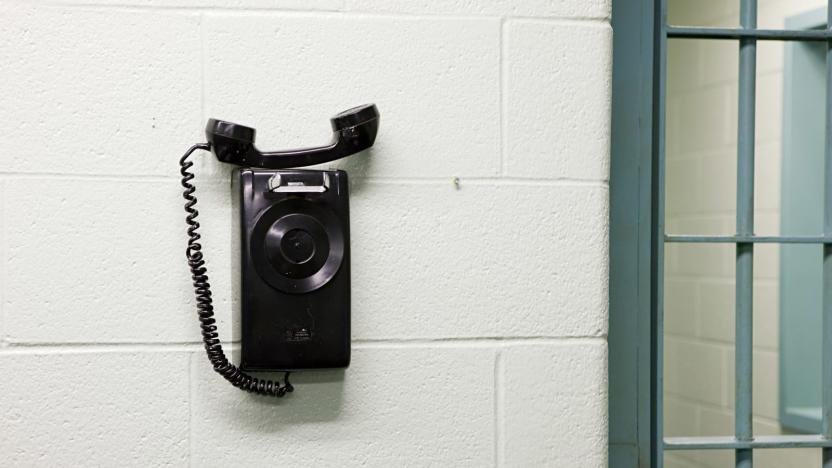BiometricData
Latest

US prisons are reportedly creating 'voice print' databases
Prisons across the United States are reportedly building biometric databases that include voice recordings of incarcerated people, according to The Intercept. The report cites contracting documents for the state of New York's prison system, as well as statements from officials in Texas, Florida, Arkansas and Arizona confirming that prisons are actively using voice recognition technology that can extract and digitize voices to create unique and identifiable biometric signatures known as voice prints.

Bournemouth bars have begun accepting a smartphone app as ID
I went to university in Bournemouth and remember fondly (and not so fondly) queueing for overpriced bars with housemates and other trainee journalists. Every Monday night was the same -- I would stand outside in the freezing cold, slowly shuffling forward until someone in my group uttered the groan-inducing phrase: "I've forgotten my ID." Oh, how times have changed. A bunch of nightclubs including Cameo, Halo, Truth, Yates and Walkabout have started accepting Yoti as an ID and proof of age. The smartphone app is supposed to be fast, secure, and more convenient because you can leave your passport and driving licence at home.

NFL players can track and sell their own health data
Professional athletes know that it's not just the matches and training sessions that matter: it's what you do in your downtime too. Whoop's wearable straps specialise in this area, tracking your movement, heart rate, and ambient temperature to better understand your health and recovery rate. Now, it's being adopted by the National Football League Players Association (NFLPA), which means straps will be handed out to every current and incoming player in the US. Whether they'll wear them is a mystery, but the hope is that they'll be used to track and optimize their training schedules, reducing injuries and improving in-game performance.

Homemade thrill ride speeds up if you're not scared enough
Roller coasters don't care how scared you are, they always follow their pre-programmed circuit to a "T." That gave Dutch artist Daniel de Bruin an idea: What if a ride could measure your fear and amp up the thrills based on that? Since he's also a designer, he decided to find out by building the Neurotransmitter 3000, a 7-meter (23 foot) high steampunk-looking ride that speeds up or slows down depending on your heart rate, body temperature and muscle tension.

FBI to roll out $1 billion public facial recognition system in 2014, will be on to your evildoing everywhere
They're watching you -- or at least will be in a couple of years. That's when the FBI is gearing up for a nationwide launch of a $1 billion project designed to identify people of interest, according to the New Scientist. Dubbed the Next Generation Identification (NGI) program, the high-tech endeavor uses biometric data such as DNA analysis, iris scans and voice identification to track down folks with a criminal history. The FBI also plans to take NGI on the road literally by using public cameras to pick faces from the crowd and cross check them with its national repository of images. Let's just say this facial technology isn't going to be used for lighthearted Japanese vocaloid hijinks or unlocking your electronic device. The use and scope of NGI, which kicked off a pilot program in February, will likely be questioned not just by black helicopter watchers but privacy advocates as well. Facial recognition has certainly been a touchy issue in privacy circles -- something Facebook learned firsthand in Germany. Meanwhile, the Electronic Frontier Foundation is already raising concerns about innocent civilians being mixed up or included in the database. Naturally, the FBI claims that the NGI program is in compliance with the U.S. Privacy Act. On the positive side, at least they didn't name it the Genetic Lifeform and Disk Operating System.

Germany challenges Facebook on facial recognition, citing EU privacy laws
Facebook's facial recognition feature probably won't find too many smiles in Germany, where federal regulators are challenging the social network to change its ways, or face the consequences. On Tuesday, Hamburg's Data Protection Authority (DPA) sent a letter to the company, advising it to obtain user permission before harvesting biometric data, as outlined by EU privacy laws that require consumer consent. As it stands right now, users can opt-out of the photo-tagging function by tinkering with their privacy settings, but the DPA claims that's still too invasive, and has "repeatedly" asked Facebook to shut down the feature altogether. Zuckerberg & Co. now have two weeks to respond to the letter, and could face a fine of up to €300,000 (about $427,000) if a compromise isn't reached. In a statement, company spokeswoman Tina Kulow said, "We will consider the points the Hamburg Data Protection Authority have made... but firmly reject any claim that we are not meeting our obligations under European Union data protection law."




